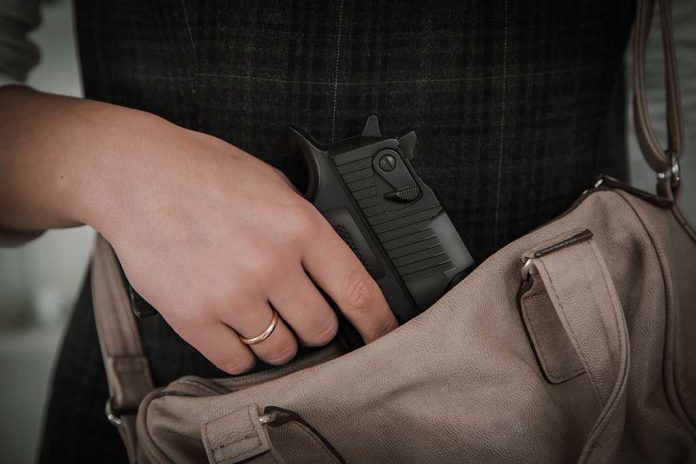
North Carolina legislators have passed a contentious bill eliminating concealed carry permit requirements, potentially making it the 30th state to adopt constitutional carry despite significant opposition from law enforcement, gun range owners, and public safety advocates.
Key Takeaways
- The North Carolina House passed Senate Bill 50, “Freedom to Carry NC,” which would allow concealed carry without a permit for U.S. citizens aged 18 and older if Governor Josh Stein signs it into law.
- The bill eliminates requirements for firearms training, mental health record disclosure, and permit applications for carrying concealed weapons.
- Democratic Governor Josh Stein is expected to veto the legislation, which narrowly passed with two Republicans voting against it.
- If enacted, North Carolina would become the 30th state to approve constitutional carry, despite an Elon University poll showing 54% of North Carolinians oppose permitless concealed carry.
- Opposition comes from across the political spectrum, including law enforcement, gun range managers, and public safety groups who cite concerns about proper training and background checks.
Constitutional Rights vs. Public Safety Concerns
The North Carolina House’s passage of Senate Bill 50 represents a significant victory for Second Amendment advocates who have long fought to remove what they see as government interference with constitutional rights. The bill, which would allow constitutional carry without a permit for U.S. citizens aged 18 and older, would eliminate the current requirements for firearms training, mental health record disclosure, and permit applications for carrying concealed weapons. Proponents argue that these changes restore fundamental rights that should not require government permission.
“It allows people to constitutionally carry a firearm without obtaining a permit from the government to exercise their God-given right to defend themselves,” said Rep. Keith Kidwell.
Similarly, Paul Valone, a gun rights advocate, emphasized: “It removes the need for that governmental permission slip.”
Opposition From Unexpected Quarters
Perhaps surprisingly, some of the strongest opposition to the bill comes from within the firearms community itself. Kenny Abbe, general manager of Calibers Indoor Gun Range, has voiced serious concerns about the legislation. Abbe, who regularly trains gun owners, argues that even the current eight-hour training course required for concealed carry permits is insufficient for proper firearms handling and safety. The elimination of even this minimal training requirement raises serious questions about public safety and responsible gun ownership.
Law enforcement officials have also expressed alarm at the prospect of more untrained individuals carrying concealed weapons. Rep. Allen Buansi warned about the impact on police officers, stating, “This bill would make their jobs a whole lot harder and put them at an even greater risk.” This concern reflects a broader worry that the legislation prioritizes an absolutist interpretation of Second Amendment rights over practical safety considerations for both the public and law enforcement personnel.
Political Fallout and Potential Veto
The bill’s passage was not a party-line affair, with two Republican representatives – Ted Davis and William Brisson – voting against it due to concerns about responsibility and safety. This bipartisan opposition highlights the complexity of gun legislation beyond simple political affiliations. With the bill now on Democratic Governor Josh Stein’s desk, most observers expect him to veto the legislation, setting up a potential override vote in the legislature.
“The safeguards we lose if we repeal the requirement for a concealed carry weapons permit are all too dangerous to risk when it comes to public carry of firearms in North Carolina,” warned Becky Ceartas, a gun safety advocate.
The political calculus is complicated by public opinion. An Elon University poll found that 54% of North Carolinians oppose permitless concealed carry, suggesting that while Second Amendment rights remain popular, there is significant support for reasonable regulations like training requirements and background checks. The poll results indicate that many citizens view these measures not as infringements on rights but as common-sense safeguards.
Evidence and Impact
Supporters of the bill often argue that “criminals will carry anyway,” suggesting that permits only restrict law-abiding citizens. However, research challenges this perspective. A 2022 Johns Hopkins University study found an 18.3% increase in gun assaults in states that relaxed gun laws, providing empirical evidence that permitless carry may have real public safety implications. These statistics contradict the notion that removing permit requirements has no effect on crime rates or public safety.
If the bill becomes law, North Carolina would join 29 other states with constitutional carry provisions. This growing trend represents a significant shift in gun policy across the country, with nearly 60% of states now embracing some form of permitless carry. However, the NRA has noted that while they support the bill as a step toward constitutional carry, it falls short of standards established in other states, suggesting there may be ongoing efforts to further relax gun restrictions.



